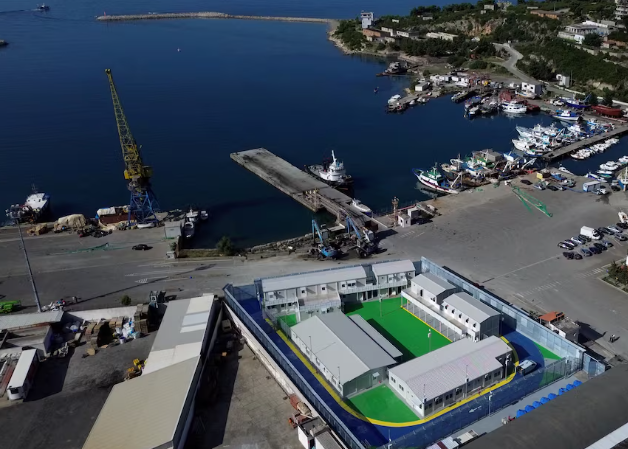A controversial migrant reception centre that Italy is building in Albania will start operating from August, Prime Minister Giorgia Meloni said on Wednesday, unveiling a “deterrence tool” during a visit to the Balkan country, IntelliNews reports.
Last November, Meloni and Albanian Prime Minister Edi Rama signed a five-year agreement under which Albania will shelter 3,000 migrants rescued from international waters every month while Italy reviews their asylum requests. Given that the asylum application process takes about a month, up to 36,000 asylum seekers could be accommodated per year.
The Italian Prime Minister toured the migrant centres with Interior Minister Matteo Piantedosi and thanked Albania for its role in accommodating thousands of asylum seekers while Italy considers their applications.
Meloni’s visit began at Gjader, a former military airport 80 kilometres north of Tirana, where construction has begun on one of two migrant centres.
She then visited the port of Shengjin, where the construction of a migrant reception centre with accommodation and offices is nearing completion. The centre covers an area of 4,000 square metres. A five-metre high barbed wire fence surrounds it.
Acknowledging a two-month delay due to unforeseen structural reinforcement work, Meloni confirmed that both centres will be operational by August 1 and ready to receive the first 1,000 migrants. Regular ferry services to Italy will begin in mid-September. Meloni said:
“The facilities will be fully run by Italy while it fast-tracks migrants’ asylum requests.”
The centres will be under Italian jurisdiction, with Albanian guards providing external security. Italy will either welcome migrants granted international protection or arrange their deportation from Albania if asylum is denied. The project will cost Italy €670mn over five years.
Deal as a gesture of gratitude to Italy
Rama, leader of Albania’s ruling Socialist Party, described the deal as a gesture of gratitude to Italy, which sheltered thousands of Albanians after the collapse of communism in the 1990s. According to a transcript published by the Albanian government, Rama said:
“I have to say that I am proud Albania can serve Italy. Italy has been useful and has served Albania many, many times and if we have the opportunity to be useful to Italy … then let’s use this opportunity.”
This agreement has strengthened relations between Italy and Albania, and Italy may increase its support for Albania’s EU accession process.
Development of bilateral relationships
Italy is an important trading partner of Albania, especially in the clothing and textile industry. According to industry representatives, Albania usually sends clothes and shoes to Italy in almost finished form, where Italian workers put the finishing touches and package the products to arrive in shops with the prestigious “Made in Italy” labelling. However, the sector has suffered from the pandemic and strengthening of the Albanian lek.
Italian investment in Albania covers other sectors including energy, agriculture, telecoms and infrastructure, and Italy is home to a significant Albanian diaspora.
Speaking at a press conference, Meloni rejected accusations that her visit to Albania was a political manoeuvre ahead of the European Parliament elections. Meloni told the press conference:
“I would like to thank Prime Minister Rama once again, the entire Albanian people for the opportunity they gave us, for the help they gave us so that we could realise this agreement and which I hope will be an example for the whole EU.”
